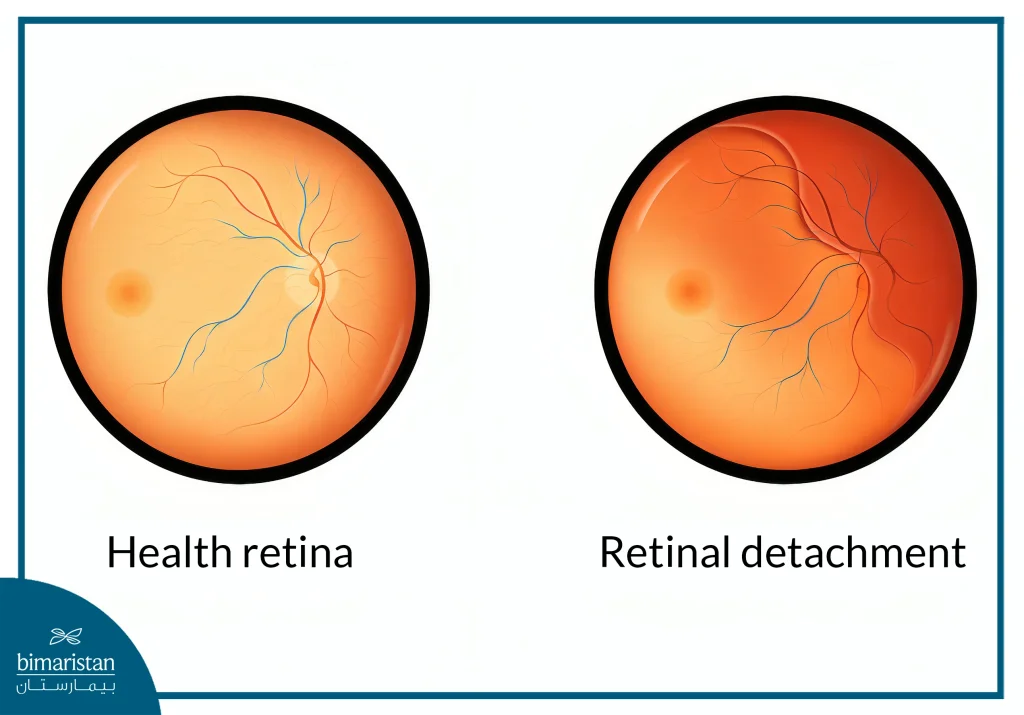Retinal diseases are a group of disorders that affect the light-sensitive layer at the back of the eye, including a wide range of conditions such as diabetic retinopathy, macular degeneration, and retinal detachment. These conditions directly impact vision and can lead to blindness if not treated early. Early diagnosis and effective treatment are critical to preserving sight. Turkey is emerging as a leading and effective center for the treatment of retinal diseases thanks to the excellence of its medical staff and the availability of the latest laser and intraocular injection technologies.
Causes and symptoms of retinal diseases
Causes of common retinal diseases
- Diabetes mellitus: Especially in cases of diabetic retinopathy.
- Aging: A major risk factor in age-related macular degeneration.
- High blood pressure: Causes damage to the tiny blood vessels within the retina.
- Genetic factors: Contribute to diseases such as retinopathy pigmentosa.
- Eye injuries: Can lead to tears or detachment of the retina.
- Rare cases: Direct exposure to very intense light, such as sunlight or lasers, can damage retinal cells.
Symptoms of retinal diseases that require treatment
- Blurred or foggy vision
- Seeing sudden flashes of light
- Floating spots (floaters) in the visual field are noticeable
- Gradual or sudden loss of vision in part of the visual field
- Difficulty seeing at night or in low light
- Distortion of images or straight lines, as in macular degeneration
The importance of early detection in the treatment of retinal diseases
Early detection helps prevent serious complications of retinal diseases and increases the success rate of available treatments such as laser therapy or injections. Some cases start without symptoms, so regular check-ups are recommended, especially for diabetics and the elderly. Early diagnosis reduces the need for surgery and preserves as much vision as possible.
The latest treatments for retinal diseases
Diabetic retinopathy treatment
Treatment of diabetic retinopathy depends on the stage of the disease. In the early stages, strict control of blood sugar and blood pressure is recommended. In advanced cases of the disease, treatments include intraocular injections of anti-VEGF drugs and focal lasers to close leaks, or vitrectomy to treat bleeding and retinal detachment.
Surgical treatment of retinal detachment
Retinal detachment requires immediate surgical treatment to preserve vision, and surgical options include: Pneumatic retinopexy, Scleral buckling, and Vitrectomy. The type of procedure is determined by the location and size of the detachment, and rapid intervention is necessary to minimize permanent damage to the visual cells and restore as much visual ability as possible.

The treatment of age-related macular degeneration depends on its dry or wet type. In the wet type, injections of anti-vascular endothelial growth factor (Anti-VEGF) drugs are used to slow the growth of abnormal vessels, while in the dry type, antioxidant supplements are recommended. There is currently no cure, but treatments aim to slow the progression of the disease and preserve vision.
Treatment of retinal diseases with intraocular injections
Intraocular injections are used to treat several retinal diseases, most notably wet macular degeneration and diabetic retinopathy. The drugs include ranibizumab (Lucentis), aflibercept (Eylea), and bevacizumab (Avastin), although used outside of official recommendations, to reduce swelling and abnormal vessel growth. The injections are given periodically into the vitreous and are effective in maintaining or gradually improving vision.
Lasers in the treatment of retinal diseases
Lasers are used to treat various retinal conditions, including diabetic retinopathy, retinal tears, and sometimes to prevent the progression of wet macular degeneration by closing leaky vessels or stabilizing the retina to reduce the risk of detachment. The most commonly used types are focal lasers and Panretinal Photocoagulation. The treatment slows vision loss but does not restore lost vision.
The cost of treating retinal diseases in Turkey and other countries
Comparison of the cost of treating retinal diseases in Turkey and other countries
| State | Average cost |
| Turkey | 600 – 1200 dollars |
| United States | 2500 – 5000 dollars |
| Canada | 1800 – 3500 dollars |
| Britain | 1700 – 3200 dollars |
| Germany | 2000 – 4000 dollars |
The cost of retinal disease treatment in Turkey
| Type of treatment | Average cost |
| Anti-VEGF intraocular injections | 300 – 600 dollars |
| Laser treatment of the retina | 400 – 700 dollars |
| Retinal detachment surgery | 1500 – 3000 dollars |
Post-treatment: Tips and instructions
Advice after retinal disease treatment
After treatment, you should avoid carrying heavy objects or bending over, refrain from swimming or exposing the eyes to dust in the early days, especially in the early days, and regular medical follow-up is necessary to monitor any changes in vision, it is also advised to monitor sugar and blood pressure levels and adhere to prescribed medications and drops. In the event of abnormal symptoms such as pain or sudden flashes of light, the patient should see a doctor immediately.
Can retinal diseases be prevented?
The prevention of retinal diseases is partly possible through controlled management of chronic diseases such as diabetes and hypertension, as well as smoking cessation and a healthy lifestyle. Regular eye examinations are also recommended, especially for people at risk. Antioxidant-rich nutrition and the use of UV-protective glasses are important factors that help maintain retinal health and reduce the risk of vision issues.
After recognizing the causes and treatments available for retinal diseases, it becomes clear that continuous medical follow-up is the cornerstone of maintaining the therapeutic results and stabilizing vision. Neglecting regular eye examinations may lead to a relapse of the condition without obvious symptoms, so it is necessary to commit to regular visits to the eye doctor, especially for patients with diabetes or high blood pressure. Prevention and ongoing care are just as important as retinal disease treatment in protecting vision in the long run.
Sources:
- National Eye Institute. (2025, May 23). About NEI. National Institutes of Health.
- MedlinePlus. (2024, March 28). Retinal disorders. U.S. National Library of Medicine
